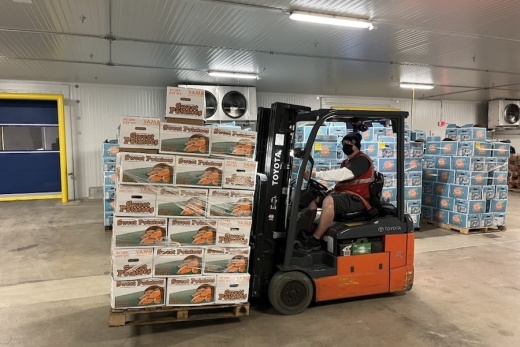The Ag Hub increases produce distribution from 22% to 40% of the food bank’s total food allocation.
It also allows the food bank to expand its reach in other ways, including providing a continuous supply of more varieties of quality produce in and out of season as well as sharing excess produce with food banks across the region.
The Ag Hub will allow the food bank to take local produce distribution to the next level, said Tejas Rane, vice president of innovation at the Tarrant Area Food Bank.
“The goal of the agriculture hub is to be the mixing center for produce that we rescue from South Texas, across the border from Mexico, Arizona and other co-ops within the Feeding America network,” Rane said.
The overview
The Ag Hub is an 8,000-square-foot refrigerated storage facility that allows food bank staff and volunteers to do three main things:
- Process produce locally: Much of the produce in Texas is typically grown and processed in the Rio Grande Valley, Rane said. The hub will allow fruits and vegetables to be processed in the heart of Fort Worth—thus increasing its freshness period—before being distributed to the more than 450 area food pantries.
- Provide trading opportunities: Rane said, being located in North Texas, the Ag Hub’s proximity to Arkansas and Oklahoma could also prove useful with food trades. Arkansas has a chicken hub and Oklahoma has a beef hub, so if there is a surplus of produce at the Ag Hub, staff could trade it for much-needed protein.
- Support local farmers: By having a large, dedicated space for produce distribution, food bank officials can expand partnerships with local and regional produce growers.
- One such partnership with a local farmer is with Cowtown Farmers Market in Fort Worth. Its Manager Becca Knutson said Tarrant Area Food Bank purchases unsold produce at the end of each Saturday market from the farmers at market cost. This program ensures farmers are able to sell their harvests even if customer traffic is low at the market. By opening the Ag Hub, the food bank will be able to bring more produce grown locally into the region for partner agencies to distribute to their clients.
“We want to be a point of contact for [groups] to bring in the produce, mix the truckloads and distribute it,” he said.
Zooming in
Through its education foundation, Northwest ISD started its partnership with TAFB in May 2021 to host a monthly food pantry at the district Administration Building on the third Saturday of each month.
“The pantry is open to anyone in the community and runs from 9 a.m. to 11 a.m. or until food runs out,” said Alyssa Pry, director of communications and public relations for Northwest ISD Education Foundation.
Pry noted that while TAFB provides all of the canned goods and produce, the foundation pays an additional amount each month to TAFB to provide protein to their clients. The new Ag Hub would mean adding yet more options for securing packages with good nutritional value.
Pry said that the NISD food pantry serves between 800 and 1,000 families each month. She added that they’ve noticed that the months when students are returning to school and holiday months typically see an increase in volume.
“We have a number of schools in that area with families on the free and reduced lunch program,” Pry said. “People would be surprised to know how much food insecurity is right in their own backyard.”The backstory
TAFB clients include people from all walks of life. The website stated more than one-third of those served by the food bank and its network are children.
TAFB partners with corporations to help carry out its mission, with one of those being Kroger. The grocery store chain has been a TAFB partner for more than 41 years.
“Kroger has contributed hundreds of millions of dollars to support hunger relief organizations and more than 3 billion meals,” Kroger Corporate Affairs Director John Votava said.
What they’re saying
- “Some people in my precinct don’t have adequate access to grocery stores.”—Gary Fickes, Tarrant County Precinct 3 commissioner
- “Next year, our goal is [to process] 7 million pounds of produce. Eventually, our goal is to hit 20 million pounds per year.”—Tejas Rane, Ag Hub manager
TAFB relies on volunteers working in its service kitchen, distribution warehouse and community gardens to help carry out its mission. Northwest ISD Mobile Food Pantry also depends on volunteers.
In addition to food, Pry said the pantry occasionally stocks free school supplies, jackets and blankets, books and other necessities throughout the year.
Donations can be made online to TAFB by visiting:
- TAFB: www.tafb.org/donate






